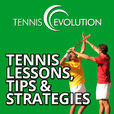
Summary: <img width="1024" height="576" src="https://blog.tennisevolution.com/wp-content/uploads/2017/04/The-One-Thing-You-Must-Do-To-Transform-Your-Tennis-1024x576.jpg" class="attachment-large size-large wp-post-image" alt="" style="float: left; margin: 0 15px 15px 0;"><p><img class="aligncenter wp-image-13247 size-full" src="https://blog.tennisevolution.com/wp-content/uploads/2017/04/The-One-Thing-You-Must-Do-To-Transform-Your-Tennis-1024x576-1.jpg" alt="" width="780" height="439"></p> <div class="smart-track-player-container stp-color-2d7bbf-EEEEEE"></div> <h2>Show Notes</h2> <p>Hey, it’s Jeff Salzenstein here, founder of Tennis Evolution, former top 100 ATP player, and USTA High Performance coach, and today, we’re going to talk about transformation, and, I actually have a question for you:</p> <p style="text-align: center;"><em>“What do you think is the quickest pathway to transforming your tennis</em><br> <em> and getting the results that you want?”</em></p> <p>Think about that for a few seconds. Do you think it’s improving your forehand? Maybe it’s getting your toss in the right place? Or how about implementing the correct strategy to beat that annoying pusher that keeps bugging you, keeps getting the best of you? Nope. It’s none of that.</p> <p>Sure, all those things can help and so much more, and as a coach, I love to get in there and fix the details to improve technique and footwork and strategy and tactics. But the reality is that it all starts with your mind. It all starts with mindset that you have every day that you step on the court, and you’ll be surprised. You actually might be more unconscious than you think. You might be more negative than you actually think that you are. It’s just conditioning. It’s the way we’ve been brought up. It’s the way we’ve been taught. It’s the way we taught ourselves, and I’m going to challenge you, that if you truly want to transform, you’ve got to change the way you think.</p> <p>Case in point. I was working with an athlete in the last week. She’s had a really rough go. She hasn’t been playing very well for this 2017 year, and she was at her wit’s end. Didn’t even want to step on the court anymore, not enjoying tennis, not having fun. And, you might think “Well, gosh. She should just have fun. Enjoy her game,” but I told her “Listen. It’s kind of hard to have fun when you keep losing all the time, when you’re losing matches, and not only losing, but you’re not playing great tennis. You’re not playing well at all, you’re struggling, you’re missing shots you used to make, you’re double-faulting more than you used to, you’re losing the big points. It can weigh on you after a while, and that’s not fun.” So, just to tell someone “Hey, have fun,” that’s not the answer.</p> <p>So, we talked about how we could make this shift happen. We talked about a lot of things, and the first thing that we wanted to focus on, for her, was to make sure that she stops being s</p>
